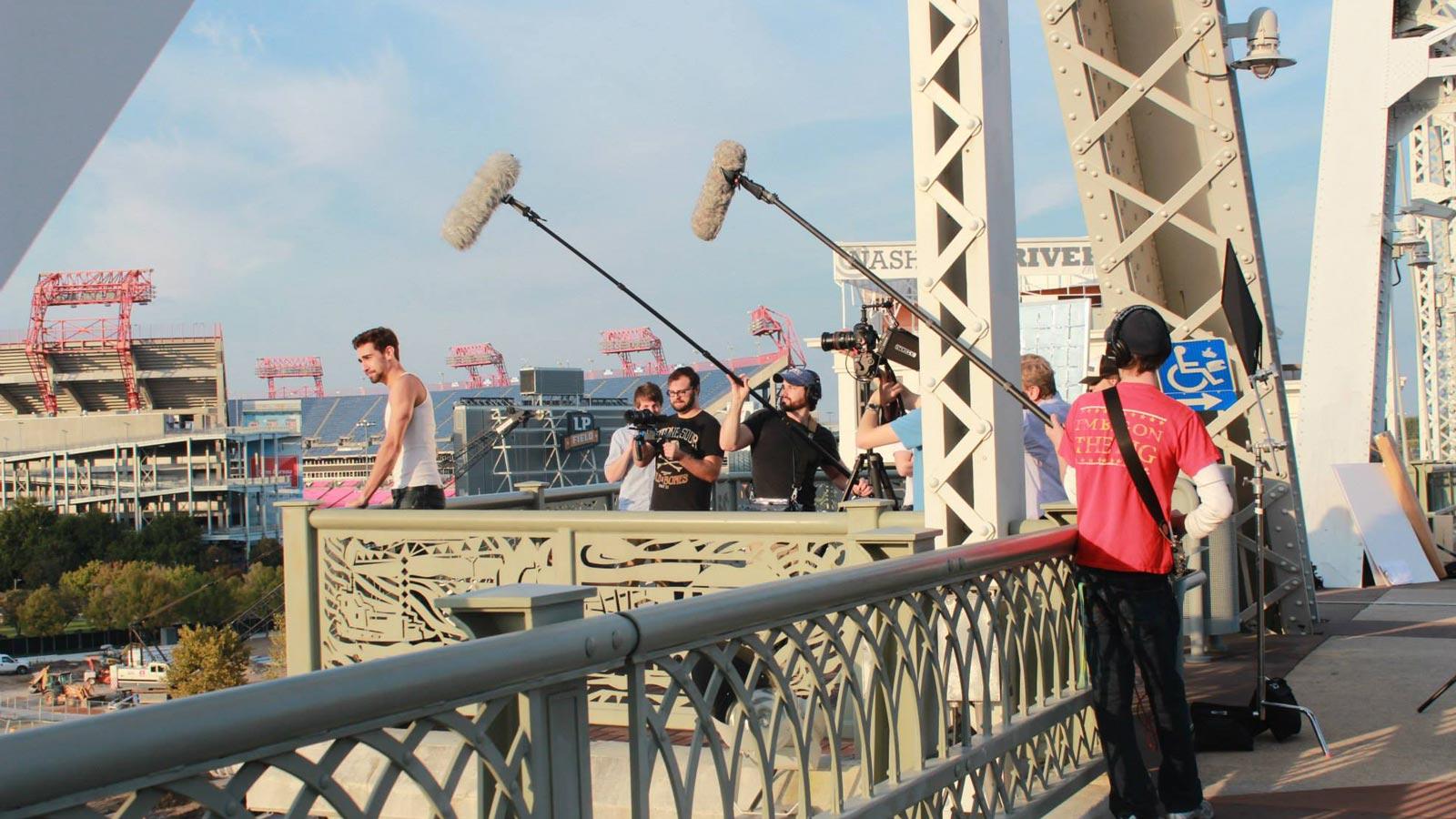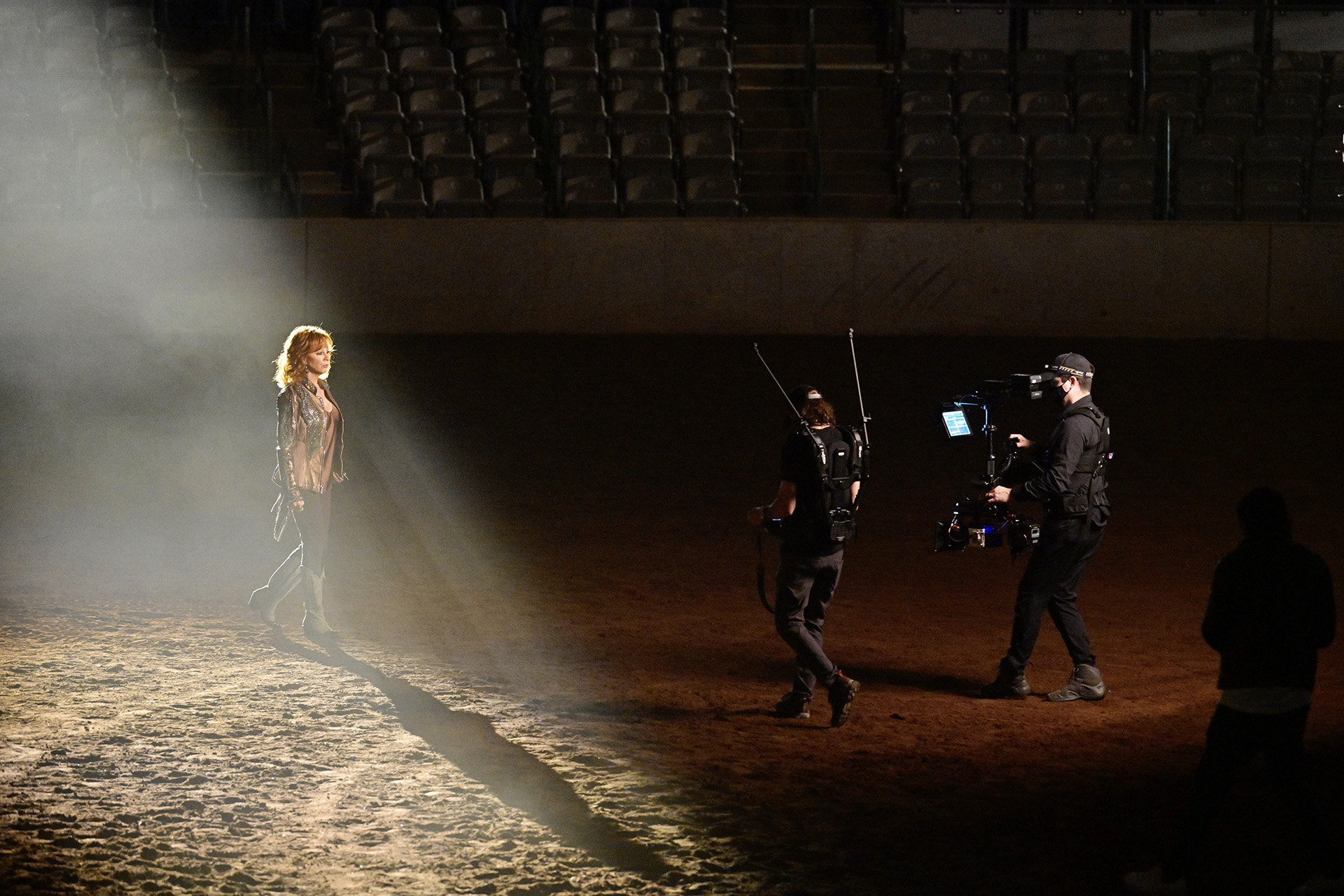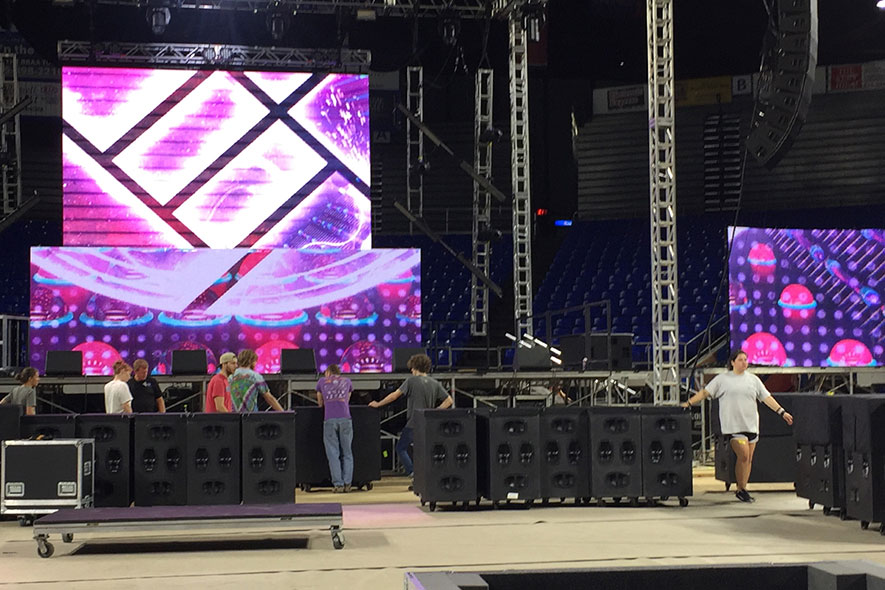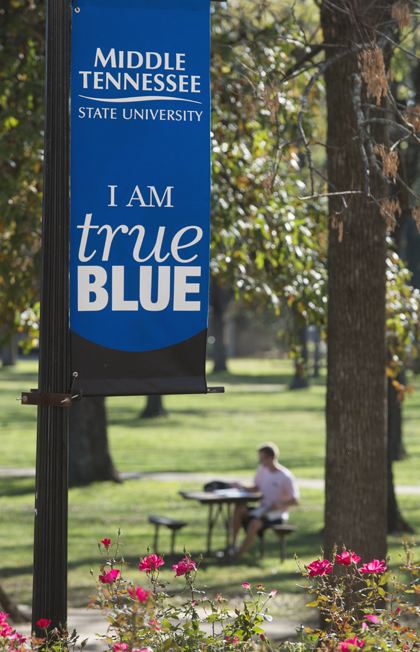
Video and Film Production
Explore the world of cinematic storytelling and gain hands-on experience necessary to create professional video and cinema projects
Video and Film Production, B.S.
The Bachelor of Science in Video and Film Production is offered by the College of Media and Entertainment at MTSU.
MTSU's Video and Film Production students learn the art of cinematic storytelling and how to apply those skills to any genre — theatrical films, documentaries, television, music videos, commercials, web content, streaming platforms, instructional films, etc. An impressive array of facilities offers students boundless hands-on experience, with a large stock of professional-quality field production gear, postproduction labs and suites, foley and audio facilities, and a large sound stage. Productions with Grammy-winning music artists, the Nashville Symphony, and Bonnaroo are regular class projects. Outside of class, Video and Film Production has student organizations that create film and television and a student-run TV station where students produce the programming and manage the station. Students may choose a concentration in Filmmaking, Motion Design, or Live Production Video and film have great power to entertain, inform, or influence. Technology has now made it possible for essentially any industry or organization to harness this power to connect with their audiences, customer, constituents, or students. MTSU's B.S. in Video and Film Production degree considers all these aspects, and reinforces them with a foundation of media theory and a 4-year degree to produce graduates who are able to successfully enter the marketplace and advance through long-term careers. The program boasts a well-developed and flexible curriculum that enables students to focus on their strengths. Inspiring and experienced faculty deliver exciting classes inside and outside the classrooms and labs. An impressive array of facilities offers students boundless hands-on experience. The Video and Film Production program offers a combination of filmmaking, video production, and live production. Students can specialize in these aspects by their choices of required course options. The program builds upon a blend of theoretical and hands-on approaches to media production. There are three concentrations offered in the Video and Film Production program:
- Filmmaking Concentration
- Live Production Concentration
- Motion Design Concentration
If you live in one of these states: AL GA; you may be able to attend MTSU at in-state rates under the Academic Common Market program.
News Briefs

MTSU students help produce music video for Reba McEntire, Cody Johnson
With Tennessee Miller Coliseum as the backdrop, MTSU alumni and students from the College of Media and Entertainment helped produce a music video for country star Reba McEntire and rising artist Cody Johnson. The video for "Dear Rodeo" was shot in the fall of 2020 and debuted a few months later. "Our students were involved in almost every aspect of this production, taking the stuff they're learning in the classroom and applying it to a big name like Reba McEntire," said MTSU digital marketing assistant, Kobe Hermann, who served as the video shoot's field producer. Jo Litzenberger, who is studying video and film production, added the experience exposed him to professional camera gear and equipment, and gave him the chance to see professionals in their element first-hand. "This is something that looks great on a resume. I really credit the university for everything that I've achieved . Not only did I get an education, but I met all the people who will help me further that education and also help me put it to use."

Invaluable partnership with VER opens doors for MTSU grads
Learning by doing has proven value, but Video and Film Production takes the concept to an extreme level, thanks to VER, the world's largest provider of video equipment for live events. "We started that partnership in 2014," says Mike Forbes, assistant director for technical systems for Media Arts. "Some of our students went there to work, and, while VER was certainly willing to train them, I heard from some friends there that they prefer more experience. When I explained that equipment limited training, the response was We can take care of that.' And they sent a huge box truck of LED equipment for us to use!" Thus MTSU students train on state-of-the-art equipment that is inventoried and updated each summer. "It's a win-win! Our students learn the equipment and technology; consequently, various companies hire our students — not just VER [although more than 16 MTSU students have joined the prestigious company]. No other university that I'm aware of has such a partnership," says Forbes. The first year's equipment was valued at about half a million dollars; currently students are working with equipment worth about $2.5 million. Students use the equipment to create video walls and special effects for three to four large events each semester — some on campus in Tucker Theatre or Murphy Center — such as awards shows, dance programs, and concerts — Ludacris in 2017. "I'm most excited about the collaboration among different departments," says Forbes, citing an end-of-the-semester show featuring bands brought in by Recording Industry, who does the audio; Theatre and Dance, lighting; and Media Arts, video. He's proud too of the successes students achieve, sharing a story of FaceTiming during his Monday morning class with a grad wrapping up from a Super Bowl half-time show the night before.
News Briefs
MTSU students help produce music video for Reba McEntire, Cody Johnson

With Tennessee Miller Coliseum as the backdrop, MTSU alumni and students from the College of Media and Entertainment helped produce a music video for country star Reba McEntire and rising artist Cody Johnson. The video for "Dear Rodeo" was shot in the fall of 2020 and debuted a few months later. "Our students were involved in almost every aspect of this production, taking the stuff they're learning in the classroom and applying it to a big name like Reba McEntire," said MTSU digital marketing assistant, Kobe Hermann, who served as the video shoot's field producer. Jo Litzenberger, who is studying video and film production, added the experience exposed him to professional camera gear and equipment, and gave him the chance to see professionals in their element first-hand. "This is something that looks great on a resume. I really credit the university for everything that I've achieved . Not only did I get an education, but I met all the people who will help me further that education and also help me put it to use."
Invaluable partnership with VER opens doors for MTSU grads

Learning by doing has proven value, but Video and Film Production takes the concept to an extreme level, thanks to VER, the world's largest provider of video equipment for live events. "We started that partnership in 2014," says Mike Forbes, assistant director for technical systems for Media Arts. "Some of our students went there to work, and, while VER was certainly willing to train them, I heard from some friends there that they prefer more experience. When I explained that equipment limited training, the response was We can take care of that.' And they sent a huge box truck of LED equipment for us to use!" Thus MTSU students train on state-of-the-art equipment that is inventoried and updated each summer. "It's a win-win! Our students learn the equipment and technology; consequently, various companies hire our students — not just VER [although more than 16 MTSU students have joined the prestigious company]. No other university that I'm aware of has such a partnership," says Forbes. The first year's equipment was valued at about half a million dollars; currently students are working with equipment worth about $2.5 million. Students use the equipment to create video walls and special effects for three to four large events each semester — some on campus in Tucker Theatre or Murphy Center — such as awards shows, dance programs, and concerts — Ludacris in 2017. "I'm most excited about the collaboration among different departments," says Forbes, citing an end-of-the-semester show featuring bands brought in by Recording Industry, who does the audio; Theatre and Dance, lighting; and Media Arts, video. He's proud too of the successes students achieve, sharing a story of FaceTiming during his Monday morning class with a grad wrapping up from a Super Bowl half-time show the night before.
Related Media

Careers in video and film production are even more diverse than the endless credits of a Hollywood blockbuster film. While most traditional jobs in the industry remain, industry changes have opened exciting new possibilities. Video is everywhere now, including in your pocket. There is more serious video and film production being done than ever before. Essentially every organization now values and relies on video and film production, and they need skilled, talented, professional help.
Examples of career possibilities include
- 3D projection mapping specialist
- Boom camera operator
- Cinematographer/camera operator
- Director
- Documentary filmmaker
- Filmmaker
- Freelance video and film producer
- Gaffer
- Instructional video writer/designer/producer
- Music video director
- On-air promotions writer/producer
- Production company owner
- Screenwriter
- Staff video producer
- Steadicam operator
- Technical director
- Television series creator
- TV commercial writer, producer
- TV sports production management/crew
- Video and film editor
- Video and film producer
- Video engineer
- Video wall specialist
- Web series producer
Employers of MTSU alumni include
- ABC
- CBS
- CMT
- Disney
- DVL Public Relations and Advertising
- DWP Live
- ESPN
- Gemini Production Group
- National Public Television
- NBC
- TNDV
- WKRN-TV
- WSMV-TV
- WTVF-TV
- WZTV-TV



Degrees
Students may choose from five Bachelor of Science (B.S.) degrees in the Department of Media Arts.
- B.S. in Animation
- B.S. in Interactive Media
- B.S. in Media Management
- B.S. in Photography
- B.S. in Video and Film Production
For complete curriculum details, click on the REQUIREMENTS tab above.
Students may minor in any program that is not under the same degree as their major. Animation majors are required to have an Art minor.
A Master of Science (M.S.) degree is available in Media and Communication.
Related Links

CONTACT US

Please fill in the form below and we will contact you very soon














